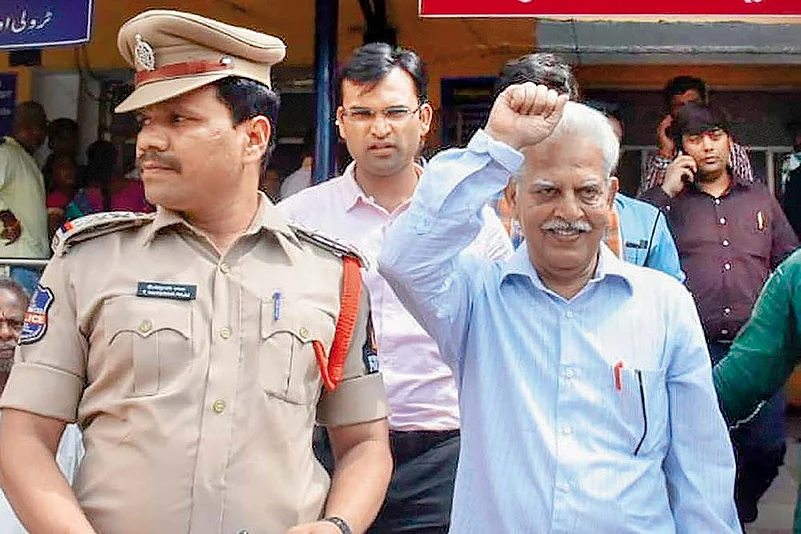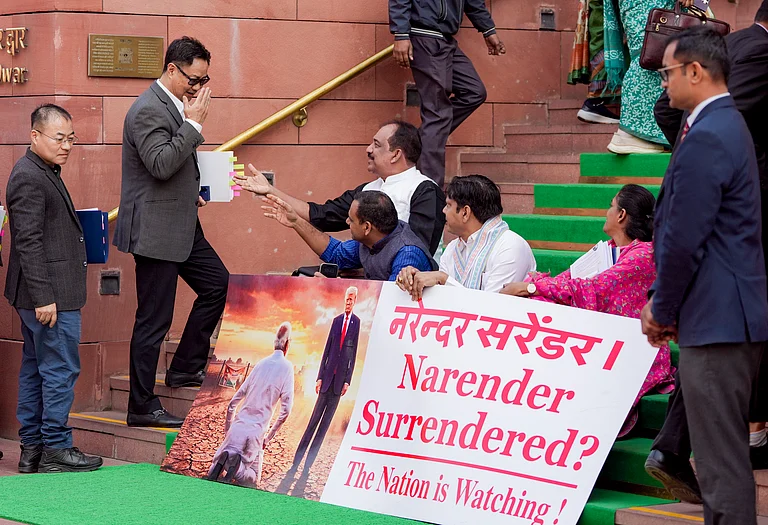The law takes its own course, but for rights activists assailed by the UAPA, that path is overly tortuous and weighted down by fraudulent police chargesheets. The charges are grave, but can scarcely survive judicial scrutiny, say supporters of Varavara Rao and Umar Khalid, of Akhil Gogoi, Natasha Narwal and Khalid Saifi. As the cases snail on in court, horrible prison conditions have taken a toll on all. Their spirit of resistance, borne along on idealism, will outlive this trial.

Top, the finished mural of Akhil Gogoi in Guwahati; below, the work scrubbed out under police pressure.
Akhil Gogoi
Unbroken Spirit
Last month, the detention of four artists in Guwahati for painting a mural of peasant activist Akhil Gogoi has renewed outrage about the plight of the RTI activist, languishing in jail for over a year, and anyone who dares to speak up for him. Gogoi, a leader of the Krishak Mukti Sangram Samiti (KMSS), was arrested by the National Investigation Agency (NIA) for alleged Maoist links.
Gogoi’s relative Manuj says the activist was denied medical help. Gogoi, who is in hospital, suffers ill health because of his torture in police custody, the kin alleges. “I met him in hospital two days ago. His spirits are high,” says Manuj, convenor of Gogoi’s newly-floated party Raijor Dal.

Assam Police detained Gogoi on December 12, 2019, and handed him over to the NIA on charges of ‘inciting violence’. Gogoi has been at the forefront of anti-CAA protests in Assam. “Gogoi protested against the CAA because of its threat to ethnic identity and indigenous people,” says Manuj. Booked under the UAPA, Gogoi’s family says the NIA failed to produce evidence. “The NIA alleges that Gogoi has Maoist connections. But they could not find any evidence. The ruling government is scared of him because he fought against communal politics and corruption,” says Manuj. His colleagues allege that the government is adopting various ‘delaying tactics’ to slow down court hearings in his case.
ALSO READ: Our Wronged Rights
Formed in 2005, KMSS has spearheaded protests against eviction of farmers and was instrumental in halting dam projects considered detrimental to the environment. Thus, Gogoi, who stood for the rights of farmers and the landless, was a bête noire for all political regimes, says a colleague, Ranjita Borah. “The government had to halt mega-dam projects because of KMSS. They have begun a project again. He is a threat to corporate interests,” she says.

Natasha Narwal
“A comrade for all”
Early this week, Mahavir Narwal received a Madhubani drawing from his daughter Natasha from Tihar jail. It shows a group of women engaged in animated conversation under a tree. The sketch, he says, is a testimony that jail life hasn’t dented Natasha’s spirit.
Natasha, a JNU scholar and a founding-member of the Pinjra Tod women’s collective, was arrested by the Delhi Police in May for allegedly inciting the Northeast Delhi riots as she participated in anti-CAA protests in Jaffrabad.
ALSO READ: Floydian Slip
Mahavir, 71, treads on a thin line of optimism. A daily phone call from his daughter keeps his spirits up. He tries to draw courage from his daughter’s fight for justice.
But, with Delhi Police slapping the draconian anti-terror law UAPA against Natasha, that struggle will be a long one. “Natasha got bail in one case as the police had no evidence,” says Mahavir. “The courts cannot ask the police for evidence on UAPA cases. The onus lies on the accused to prove that she is innocent. It’s a blatant violation of human rights,” he says.
ALSO READ: Mind The Gap
Mahavir says India faces a bleak phase in protecting individual rights. “Change will happen when people become aware of their rights.” He is also amazed at his daughter’s unwavering grit. “She is ideologically strong, with great clarity of thought. She doesn’t claim to be a champion of human rights, but she is a comrade for all,” says the proud father. In prison, he tells Outlook, Natasha keeps herself busy by teaching children and other inmates. “She has been given charge of the jail library too”.


Varavara Rao
The Unwavering Hand
“This is jail for the voice and the feet/ But the hand hasn’t stopped writing/ ... /Dream still reaches to the horizon of light/ Travelling from this solitary darkness…” Thus a poem written by revolutionary poet-activist Varavara Rao during his incarceration in 1973. But the harsh realities of two years in prison have taken a horrific toll on the 81-year-old and his family, says his daughter Pavana. Rao was arrested in November 2018 in connection with the Elgar Parishad case and is lodged at Taloja jail in Maharashtra’s Navi Mumbai. The grievously ailing poet was deprived of basic rights such as medical care, laments Pavana, a Hyderabad-based lecturer. Currently admitted to Mumbai’s Nanavati hospital, Rao will be sent back to jail on January 7.
ALSO READ: Rights Diary
Rao, along with 15 others, have been arrested and booked under the UAPA by the Pune Police, who claim that the accused were plotting to kill PM Narendra Modi.
In the past two years, the courts have also refused to grant Rao bail sought on grounds of old age and ill-health. Then, in July, his condition worsened. “He was delirious and hallucinating,” says Pavana. The Bombay High Court had to intervene to grant permission for the family to access healthcare and meet him in the hospital. “When he tested positive for Covid, I feared the end. He miraculously came out of it all,” she adds.
Rao struck a chord with inmates in Pune’s Yerwada Jail, where he was lodged before Taloja. In letters to Pavana, he spoke about his bonding with those on death row, Dalits, oppressed castes, the poor and Muslims. It’s supremely ironic that this unflinching believer of human rights has been charged with “destabilising the country”. But, says Pavana, “my father never loses hope”.

Kabir Kala Manch
‘Is it a crime to sing about Ambedkar?’
As another anniversary of the battle of Bhima Koregaon passes us by, it serves as a grim reminder to the plight of rights activists, academics and intellectuals jailed over the past two years. At least 16 activists and academics were arrested in connection with the Elgar Parishad- Bhima Koregaon violence in 2018. Three members of the Pune-based Dalit cultural outfit Kabir Kala Manch—Sagar Gorkhe, Ramesh Gaichor and Jyoti Jagtap—were arrested by the NIA in September 2020.
ALSO READ: Evidence Of Absence
The charges are the same: links with Maoist groups. Gaichor’s father, Murlidhar, fails to comprehend the charge. Gaichor, a founder-member of Kala Manch, was an Ambedkarite who worked for Dalits and the poor people, says the distraught father. The family of six lives in a single bedroom apartment in Yerawada, Pune.
The Kala Manch was one of the 260 civil society groups that organised the Elgar Parishad on December 31, 2017, to commemorate the 200th year of the battle of Bhima Koregaon in Pune. The authorities claim that the conclave led to largescale violence at the Bhima-Koregaon war memorial the next day. Murlidhar also wonders why his son was arrested for staging a play on communal harmony during the Parishad.
Kabir Kala Manch has been targeted by governments because it worked against all forms of oppression, says Rupali Jadhav, a member. She says that its focus on caste, class and gender has been anathema to the centres of power. “The NIA doesn’t have any evidence against any of us. Our plays and songs at the Elgar Parishad are available in the public domain. What is our crime?” asks Jadhav. “The ruling dispensation is scared of the broad unity of Dalits, Adivasis and other minority communities,” she adds.
ALSO READ: Tiger, Tiger Whining Bright!

Khalid Saifi
‘He worked for communal harmony’
It was a present few children would be in a position to covet. Like every year, on Christmas Eve, seven-year-old Mariam hung stockings on the wall and made a wish to Santa. This year, it was to return her ‘Abbu’ from Tihar jail. Mariam was disappointed when Nargis Saifi, her mother, told her that Abbu was “too big” for the stockings. Mariam and her two siblings miss their father, Khalid Saifi, terribly. Saifi, a founder-member of United Against Hate (UAH), was arrested by the Delhi Police in connection with the communal violence in Northeast Delhi in February 2020.
Nargis has spent the past 10 months in anguish over Saifi’s fate and the attendant financial hardship. Amidst the gloom, she draws sustenance from the fact that the court has given Saifi bail in two cases out of the three registered by the police. The police have also booked Saifi under the dreaded Unlawful Activities (Prevention) Act (UAPA), imputing his role in the larger ‘conspiracy’ to engineer the riots. As the court is slated to hear Saifi’s bail plea in the third case in January, Nargis hopes for justice. “I have faith in the Constitution. My husband worked for communal harmony and brotherhood,” says the 33-year-old.
ALSO READ: In Our Roots Are Our Rights
The toughest ordeal of Nargis’s life began when Saifi responded to a call for help from the Khureji protest site on February 26. Nargis was shaken when she met him the next day at Mandoli jail. “He was on a wheelchair; both his legs were plastered. There were bruises all over his body,” she recollects.
Though the police accuse him of ‘hate speech’, Nargis says Saifi spoke about the rights of citizens through the UAH in response to the rising cases of lynching and hate crimes. UAH was also active in protests against the Citizenship (Amendment) Act (CAA) and NRC.
“My children watch The Legend of Bhagat Singh on loop. They say that Abbu is in jail because he worked for the poor, just like Bhagat Singh,” smiles Nargis.

Umar Khalid
Staying In The Fight
On December 22, Sabiha Khanum, mother of former JNU student leader Umar Khalid—who had completed 100 days in Tihar jail—was an active presence in public meetings and webinars that day, organised by rights organizations demanding the release of the 34-year-old. Khalid was arrested by Delhi Police in September for his alleged role in the Delhi riots. Khanum says her son’s imprisonment has firmed her commitment to political activism. She is now prepared to put up a long fight for her son and the values he stood for. “It pains and hurts me a lot. But I am not weak. I am not afraid of anyone and we need to keep the fight alive,” she says.
ALSO READ: Silent Alarm
The police allege that Khalid, a founder-member of UAH and who was at the forefront of anti-CAA protests, was one of the main instigators of the riots. Accusing him of making incendiary speeches, Delhi Police have charged Khalid under various sections of the UAPA. Khanum sees in that the government’s suppression of dissent. “It’s ridiculous that he’s charged with murder, rioting, conspiracy….. Umar can’t even bear to see animals in pain,” she says.
Khanum says she still has faith in the Constitution. “We shouldn’t lose hope, though the future looks bleak. The government controls all the institutions now,” she says. Khanum also points out the deliberate attempts to vilify, and boycott, the family. “My daughter’s friend faced flak for mingling with us, as we have a ‘terrorist’ tag,” she says. Khanum admits that “the mother takes over the activist in her” at times. “Umar’s cell is open from all sides. It must be very cold. But he keeps telling me that he doesn’t feel cold. My son is brave,” she says.
ALSO READ:


























